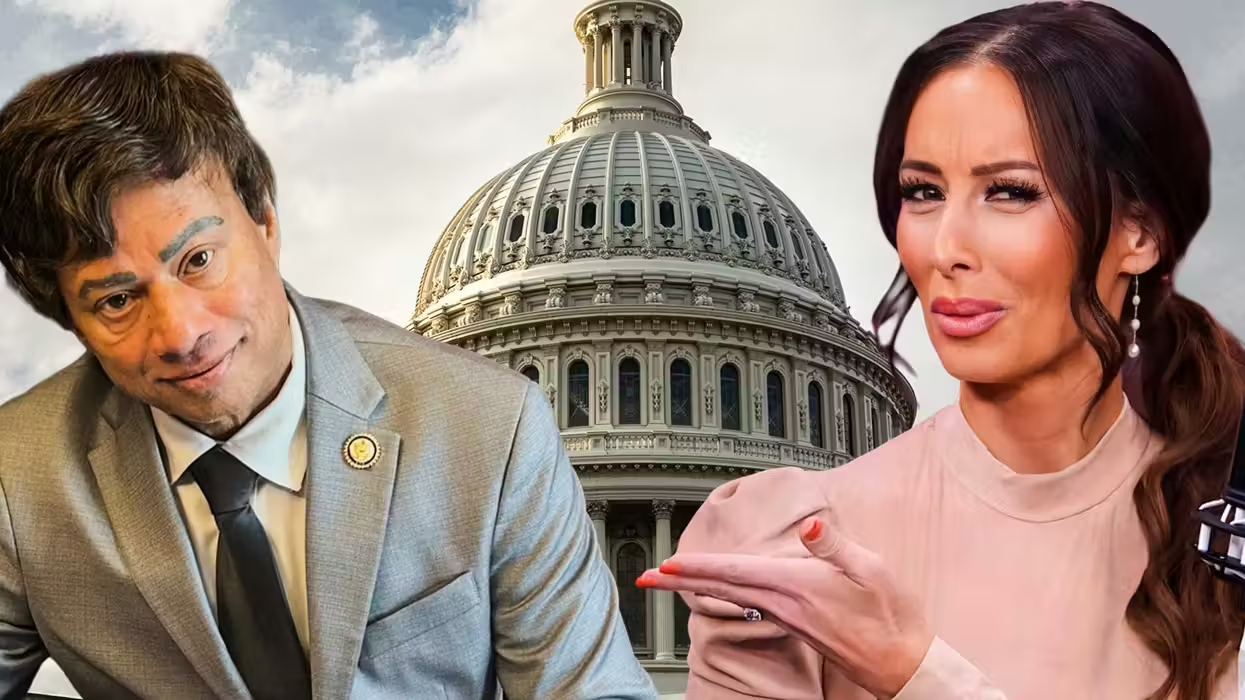Commentary by: Mark Trammell, Legal Director, Liberty Center for Law & Policy. As an attorney with the Liberty Center for Law and Policy (LCLP), a partnership between Liberty Counsel and Liberty University School of Law. In his role as Legal Director, Mark seeks to advance religious freedom, the sanctity of human life, the family, limited and responsible government, and support for Israel by working with elected officials on both the federal and state levels.
–
Recently, Rep. Randy Weber (R-Texas) introduced the “State Marriage Defense Act of 2014.” Shortly thereafter, Sens. Mike Lee and Ted Cruz introduced its companion bill in the United States Senate.
The bill is simple. In short, it states that for the purposes of federal benefits, federal agencies will determine whether a marriage qualifies for those benefits based upon the domicile of the person filing for marriage benefits, not the state in which the marriage ceremony was celebrated.
Before I explain further, let me preface by saying that I appreciate and commend the intent of these legislators. Without question, these men are dedicated to protecting the Constitution and defending the institution of marriage.
 Tea party conservatives Sen. Ted Cruz, R-Texas, and Sen. Mike Lee, R-Utah, right. Credit: AP
Tea party conservatives Sen. Ted Cruz, R-Texas, and Sen. Mike Lee, R-Utah, right. Credit: AP
However, the State Marriage Defense Act of 2014 is not the answer.
The Natural Law
The institution of marriage is intertwined within the very fabric of the Natural Law. Shortly after the Court’s decision in United States v. Windsor, where the Court held that Section Three of the Defense of Marriage Act was unconstitutional, more than 200 leaders signed a coalition statement that explains the relationship between marriage and the Natural Law.
Among the signatories are pastors, university presidents and deans, chairmen, authors, activists, editors, presidents of nonprofit organizations, journalists, and even a former governor. The statement reads:
We affirm that marriage and family have been inscribed by the Divine Architect into the order of creation. Marriage is ontologically between one man and one woman, ordered toward the union of the spouses, open to children and formative of family… Marriage as existing solely between one man and one woman was not an idea manufactured by religion or civil government. It precedes both. Though affirmed, fulfilled, and elevated by our faith, the truth that marriage can exist only between one man and one woman is not based on religion or revelation alone, but on the Natural Moral Law, written on the human heart and discernible through the exercise of reason.
As a component of the Natural Law, authored by God, the institution of marriage is beyond the ability of mankind to change. Simply put, it is a law given to us by God and since God’s ways are justice (Deuteronomy 32:4) and His ways are higher than our ways (Isaiah 55:9). God’s law is, as Alexander Hamilton wrote, “superior in obligation to any other.”
Our nation was founded upon the idea that there are certain rights and laws that man receives from God, not government. It was this idea that “all men are created equal, that they are endowed by their Creator with certain unalienable Rights” that served as the foundation for our independence as a nation. These “unalienable Rights” that are “endowed by their Creator” are recognition of the Natural Law authored by God. If that were not the case, then there would not have been any basis for the American Revolution.
The Tenth Amendment
Here, with regard to the State Marriage Defense Act of 2014, proponents of the bill claim that the states have the authority to define marriage as they see fit or by the majority vote of a state’s electorate.
In his press release, dated Jan. 9, 2014, Rep. Weber stated, “I drafted the ‘State Marriage Defense Act of 2014’ to help restore the 10th Amendment, affirm the authority of states to define and regulate marriage, as well as, provide clarity to federal agencies seeking to determine who qualifies as a spouse for the purpose of federal law.”
 Credit: AP
Credit: AP
In what to me looks to be identical press releases offered by Sens. Lee and Cruz, Sen. Lee (R-Utah) writes, “How a state should define marriage should be left up to the citizens of each state.” Sen. Cruz (R-Texas) stated, “We should respect the states, and the definition of marriage should be left to democratically elected legislatures, not dictated from Washington.”
The Tenth Amendment, which Rep. Weber expressly references, states “the powers not delegated to the United States by the Constitution, nor prohibited by it to the states, are reserved to the states respectively, or to the people.”
Logically, to delegate or reserve something for someone or something else, one must first possess what one desires to delegate or reserve. In other words, I cannot give someone a gift if I do not first possess what I intend to give away.
Here, in regard to the State Marriage Defense Act of 2014, the same truth applies.
The Constitution only can reserve for the states what it owns or has authority to convey. As such, the Constitution reserves for individual states what it has not delegated to the United States. For one to state that the Tenth Amendment reserves the authority for states to define marriage according to the will of the citizens of that state is to say that the Constitution had authority over the Natural Law.
Such a conclusion is contrary to the essence of the Natural Law and is contrary to Scripture. It is to say that a document, the Constitution, which was created by the Founding Fathers, had authority over the Bible. The logical conclusion then would be that our jurisprudence is based on moral relativism, which cannot be true.
Endorses Windsor
Whether intentional or not, the State Marriage Defense Act of 2014 endorses the Court’s decision in Windsor, which makes it even more unbelievable that even the most conservative members of Congress are endorsing this bill.
In Windsor, the Court cited to Federalism, Due Process, and Equal Protection in its rationale for declaring Section Three of DOMA unconstitutional. As such, the Court stated that issues of domestic relations are a matter for state law.
The State Marriage Defense Act of 2014 perpetuates the falsehood that marriage is exclusively a state issue, as evidenced by citing the Tenth Amendment as authority. By codifying a state’s ability to define marriage according to the popular vote, and then use that voter-defined marriage definition for purposes of federal benefits, the State Marriage Defense Act of 2014 advances same-sex marriage.
 A man dressed as Jesus attends a rally celebrating the Supreme Court rulings on same-sex marriage, June 26, 2013 in West Hollywood California. The US Supreme Court on Wednesday struck down the Defense of Marriage Act (DOMA), a controversial federal law that defines marriage as a union between a man and a woman and also ruled that Proposition 8, California's ban on gay marriage, could not be defended before the Supreme Court, paving the way for the resumption of gay marriages in California. Credit: AFP/Getty Images
A man dressed as Jesus attends a rally celebrating the Supreme Court rulings on same-sex marriage, June 26, 2013 in West Hollywood California. The US Supreme Court on Wednesday struck down the Defense of Marriage Act (DOMA), a controversial federal law that defines marriage as a union between a man and a woman and also ruled that Proposition 8, California's ban on gay marriage, could not be defended before the Supreme Court, paving the way for the resumption of gay marriages in California. Credit: AFP/Getty Images
Additionally, because the State Marriage Defense Act of 2014 codifies Windsor, it stands in juxtaposition to the Federal Marriage Amendment, which was introduced by Rep. Tim Huelskamp (R-Kan).
The Federal Marriage Amendment is a proposed amendment to the United States Constitution, the highest level of federal law. As previously discussed, proponents of the State Marriage Defense Act, by citing authority under the Tenth Amendment, believe, in accordance with the Supreme Court in Windsor, that marriage policy is a matter exclusively for states to determine. It is inconsistent to support both the State Marriage Defense Act and the Federal Marriage Amendment because these bills represent opposite philosophies pertaining to marriage policy.
Conclusion
The State Marriage Defense Act of 2014 does not reconcile with the Natural Law. Because the definition of marriage is a component of the Natural Law, and the Natural Law is of higher obligation than man-made law (Ex: federal law, state law, etc.) then the statement that marriage should be “left up to the citizens of each state” or “left to democratically elected legislatures” is in stark contradiction to the Natural Law.
Bottom line, the Tenth Amendment doesn’t give states the jurisdiction to amend the Natural Law.
Ultimately, citing a Tenth Amendment right for citizens or elected legislatures to redefine marriage is harming marriage, not defending it, because such a statement endorses moral relativism.
If our jurisprudence is based on moral relativism, and under the Tenth Amendment a state can redefine marriage by popular vote, then marriage can be anything so long as enough people vote for it.
Taken a step further, if moral relativism were the basis of our jurisprudence, then anything that is illegal today could be legal tomorrow, provided that it is the collective will of the electorate. Although the State Marriage Defense Act of 2014 seems simple, the ramifications of it are wide-reaching and ghastly.
–
TheBlaze contributor channel supports an open discourse on a range of views. The opinions expressed in this channel are solely those of each individual author.


 Tea party conservatives Sen. Ted Cruz, R-Texas, and Sen. Mike Lee, R-Utah, right. Credit: AP
Tea party conservatives Sen. Ted Cruz, R-Texas, and Sen. Mike Lee, R-Utah, right. Credit: AP






